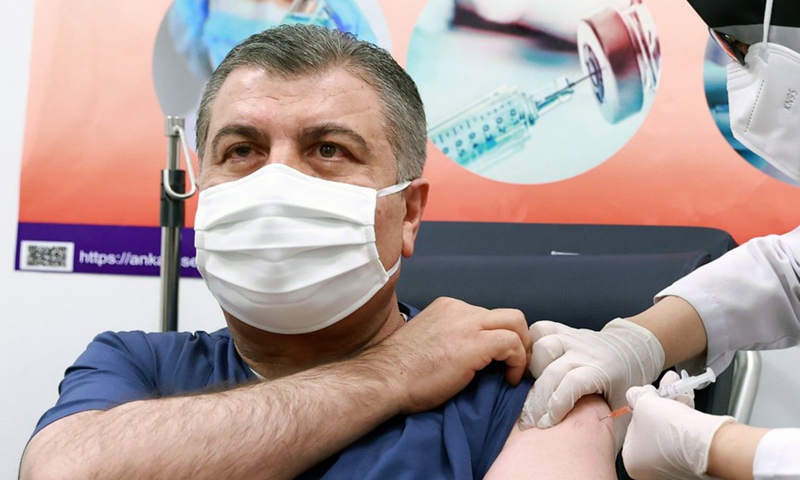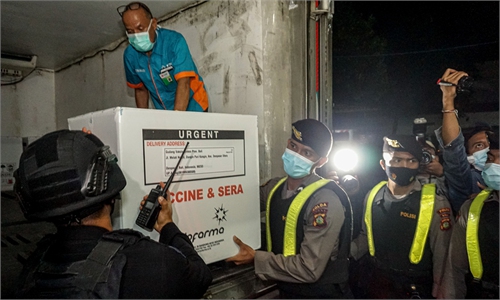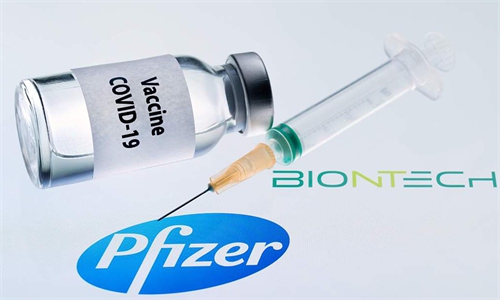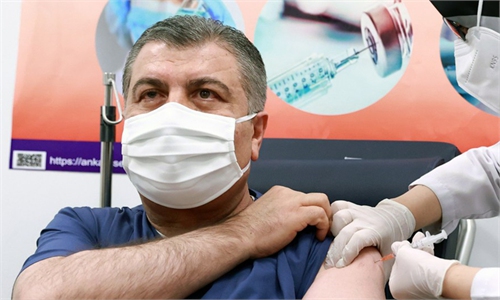
Turkish Health Minister Fahrettin Koca receives a dose of China's Sinovac COVID-19 vaccine in Ankara, Turkey, Jan. 13, 2021. Photo: Xinhua
Harry Roque, spokesperson of Philippine President Rodrigo Duterte, said during a regular press briefing on Monday that Filipinos who want to be vaccinated with Pfizer's COVID-19 vaccine have a "colonial mentality," according to Philippine media outlet Inquirer.net.Roque's words have triggered large-scale discussions online.
Western developed countries' medicines, including vaccines, still enjoy a relatively high degree of trust worldwide. But in terms of the COVID-19 pandemic, Pfizer's vaccine requires strict conditions of temperature and transportation, as well as advanced cold-chain storage facilities. These conditions have turned out to be hard in remote areas and many developing countries. But China's vaccines can be stored at normal refrigerator temperatures, which provide another option for developing countries and a boost in the global COVID-19 fight.
If there are only Pfizer's vaccines, vaccination still seems very far away for developing countries. And without Chinese vaccines, most countries will have to be subject to the US and Western vaccines.
But some Western elites would rather let developing countries continue to be trapped in the epidemic than see them get out of the COVID-19 quagmire with Chinese vaccines. This is what could be summed up as the mentality of colonizers.
Some Western media are keen to hype and exaggerate the weaknesses of Chinese vaccines. But facts have proven that China's inactivated vaccines are safer than Pfizer's mRNA vaccines, and would result in fewer side effects. This has been confirmed in the Phase-III clinical trials in many countries and regions. However, Western media have deliberately downplayed or ignored these facts, trying to confuse other countries and the public. This is irresponsible. It is an ideological obstruction of the world's cooperation on the COVID-19 fight.
However, how much of Pfizer's vaccine can be distributed to the developing countries? Can developing countries receive a large amount of Western vaccines right away? This does not seem realistic.
In November 2020, Pfizer said it expected to ship half of the COVID-19 vaccines it had originally planned for the year, highlighting the challenges it met in supply chains. Although Pfizer plans to boost vaccine capacity this year, the World Health Organization said that it still takes time to produce and administer enough doses to finally stop the viral spread. Pfizer's vaccine will first be allocated to the US and its major Western allies. Developing countries are not their first consideration.
By comparison, Chinese COVID-19 vaccines are truly global public goods. China is endeavoring to make the vaccines free for its people. Because of the Chinese vaccines, ordinary people in underdeveloped countries can get the same vaccine treatment as rich people in the West.
The People's Vaccine Alliance has exposed a cruel reality: Data shows that rich countries, representing just 14 percent of the world's population, are hoarding COVID-19 vaccines and have bought 53 percent of all the most promising COVID-19 vaccines so far. At the critical moment of the world's pandemic situation, Chinese vaccines have provided more guarantees for the fairness and justice in the world's COVID-19 fight.
Chinese vaccines have also gained the trust of many countries. Countries including Egypt, Ukraine, Pakistan and Thailand are lining up to purchase Chinese COVID-19 vaccines. Duterte on Wednesday also defended his government's decision to purchase Chinese vaccines. All these have confirmed the fact that Chinese vaccines will become the main forces in the global fight against the raging pandemic, whether Western countries are willing to see it or not.



